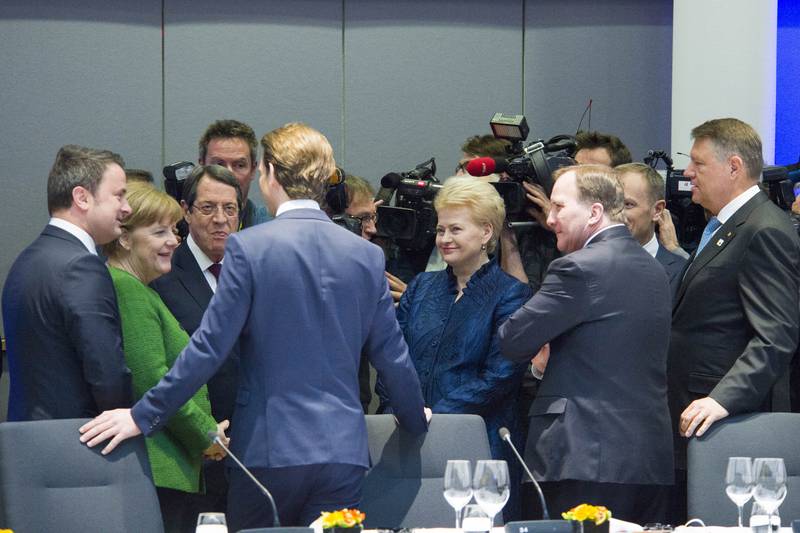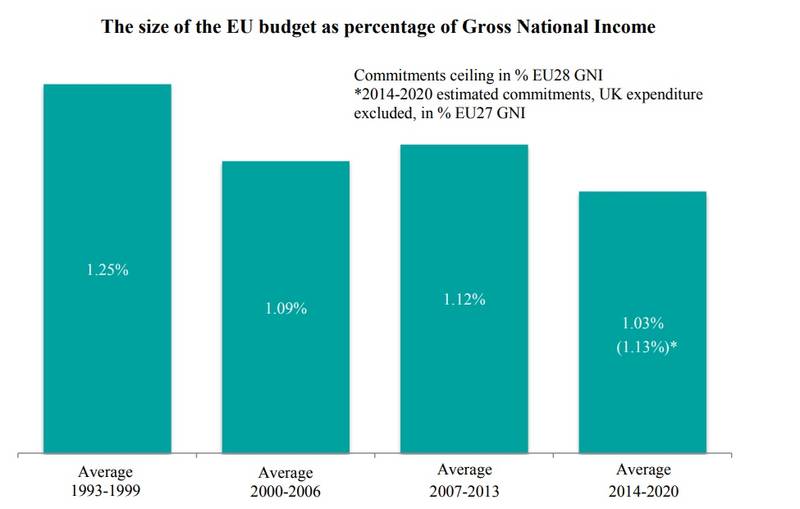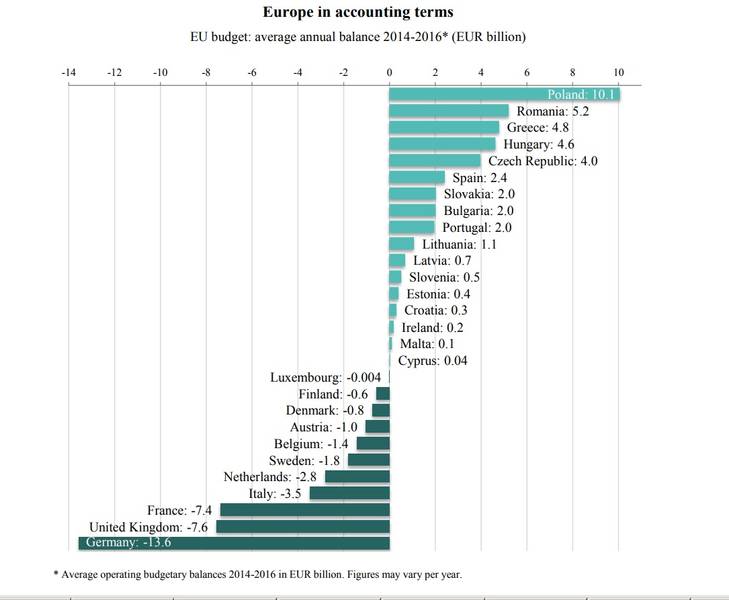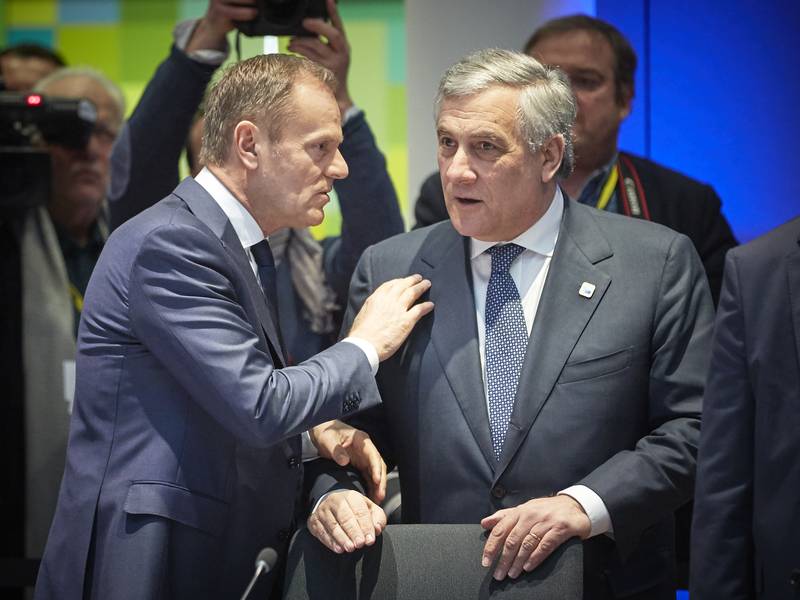Negotiations on Next EU Budget Start in a Race with Time
Adelina Marini, March 21, 2018
 Contrary to expectations, the first talks about the next multiannual budget of the EU (covering the period 2021-2027) passed surprisingly peaceful and in agreement. The EU summit on 23 February was the first opportunity the leaders of the 27 member states exchanged positions about the future form, size and conditionality of the multiannual financial framework (MFF). "And I am pleased to say that all the leaders approached it with open minds, rather than red lines", announced European Council President Donald Tusk (Poland, EPP) after the end of the one-day long informal summit in Brussels. A surprise of the peaceful tone of the debate expressed also European Commission President Jean-Claude Juncker (Luxembourg, EPP). "[T]he debate was less conflictual than I thought it's going to be", he shared.
Contrary to expectations, the first talks about the next multiannual budget of the EU (covering the period 2021-2027) passed surprisingly peaceful and in agreement. The EU summit on 23 February was the first opportunity the leaders of the 27 member states exchanged positions about the future form, size and conditionality of the multiannual financial framework (MFF). "And I am pleased to say that all the leaders approached it with open minds, rather than red lines", announced European Council President Donald Tusk (Poland, EPP) after the end of the one-day long informal summit in Brussels. A surprise of the peaceful tone of the debate expressed also European Commission President Jean-Claude Juncker (Luxembourg, EPP). "[T]he debate was less conflictual than I thought it's going to be", he shared.
Most member states agreed that the size of the budget should increase, as Mr Juncker counted 14 or 15 countries which clearly stated their intentions to increase their contributions. There is also an agreement on the change of priorities. The peaceful tone, however, is a calm before the storm. The focus of the summit was actually different - the leaders discussed much more in detail the next European elections as they are awaiting the European Commission to publish its final proposal on the very important issue of the common multiannual budget, which will give a start to the big negotiations on every euro. This will happen in the beginning of May (2 May). Not only that the battle for the filling of the 10 billion euros gap left after Britain leaves the EU, but the negotiations are also in a direct race with time.
The previous negotiations on the current MFF (2014-2020) took 29 months, 20 of which were spent in negotiations in the Council and the European Council. Negotiations with the European Parliament, which has a veto power on this issue, took 4 months and a half, and the voting of the proposal took the Parliament another 4 months and a half, Donald Tusk's calculations show. This would not have been a problem from the point of view of the budget itself if it were not for the European elections next year which is why the European Parliament insists negotiations to conclude by the end of its mandate (April 2019). This means negotiations in the Council and the European Council should take no more than 7 months, which will leave the European Parliament 3 months for negotiations and voting. Although the heads of state and/or government are generally inclined to hurry up, the prevailing opinion is that this is unrealistic.
According to Donald Tusk, it is more likely to achieve as much progress as possible in 2019 and the final decision to be left to the new European Parliament. However, there are some serious risks because its composition is still unclear. Elections in Italy suggest that the eurosceptic and populist crisis has not at all left the stage. European Parliament President Antonio Tajani (EPP, Italy) insisted the MFF is voted before the European elections, and Jean-Claude Juncker warned that a delay could have other consequences: "If we don't have any financial perspective agreed on by Dec 2019, we won't have any basis for discussing and voting of the budget for 2020, and what will be the consequences of that? We will lose 5 000 research jobs month after month in Europe".
And negotiations will not easy at all
 In addition to the race with time, the agreement of priorities and their financing will not be an easy task as well. In preparation for the summit, the European Commission published a communication in which it outlines how much will cost all the things that the member states have so far stated as a priority. First and foremost, external borders protection. Due to the migration crisis, in 2016, it was decided to establish the European Border and Coast Guard. By 2020, it will have 1 015 staff plus another 1 500 national staff who will be ready for rapid deployment if needed. This means that the annual budget of the agency must be increased from 292 million euros to 335 million.
In addition to the race with time, the agreement of priorities and their financing will not be an easy task as well. In preparation for the summit, the European Commission published a communication in which it outlines how much will cost all the things that the member states have so far stated as a priority. First and foremost, external borders protection. Due to the migration crisis, in 2016, it was decided to establish the European Border and Coast Guard. By 2020, it will have 1 015 staff plus another 1 500 national staff who will be ready for rapid deployment if needed. This means that the annual budget of the agency must be increased from 292 million euros to 335 million.
In addition, the EU co-finances the member states for the protection of the European external border in which participate 96 000 national border guards. The total sum of border protection activities amounts to 4 billion in a 7-year period, which is 0.4% of the current size of the common EU budget. If member states want to continue to develop their common protection of external borders, as such an ambition is stated, this means the budget for this heading to increase. The Commission proposes several scenarios. A double increase of the current budget - 8 billion or 0.8% of the current size of the MFF, for which the member states will receive further development of the exchange of information among them, and ensuring the necessary equipment for the European Border and Coast Guard.
The more ambitious scenario is to expand the agency's mandate which means its staff to increase by at least 3 000 people, to increase the financial support for the most vulnerable countries, better equipment. Under this scenario, the budget jumps to 20-25 bn euros for a 7-year period, which is about 1.8%-2.3% of the current MFF size. There is an even more ambitious scenario in which the European border management system will have 100 000 at its disposal and a significant reserve of equipment, comparable to that of the US and Canada. The price tag for this is 150 billion euros in a 7-year period, or 14% of the current MFF. To compare, the US Customs and Border Protection Agency has an annual budget of 13.56 billion dollars and more than 62 000 staff. The Canada Border Services Agency has an annual budget of around 2 billion Canadian dollars and 14 000 staff.
The member states have begun deeper integration in the area of defence as well, which also demands major investments at supranational level. Last year, the European Defence Fund was established with an initial budget of 90 million euros for defence research and 500 million for industrial development for the period 2017-2020. This is about 0.05% of the current financial perspective. According to the Commission, if the EU wants to achieve its ambition the Fund's budget should be increased up to 7 billion euros in the next 7-year period. This will correspond to 14% of national spending for defence capabilities. The Commission recalls that the EU treaties do not allow the European budget to cover all areas of activity the member states deem necessary to cover, which is why it proposes to create a separate finance mechanism of 10 billion for the period 2021-2027.
There is unanimity in the EU also about increasing the budget of the student exchange programme Erasmus+. Its current size is 14.7 billion euros which is about 1.3% of the MFF. If the number of young people taking part in the programme is doubled to reach 7.5% of Europe's young population around 30 billion euros of investments will be needed in the next framework. And if the more ambitious version is adopted - every 1 in 3 young people to take part in Erasmus+ - this will inflate the check to 90 billion for 7 years.
Another priority that has emerged as a major one in recent years is digitisation. Currently, the EU is investing in data infrastructure, connectivity and digital skills around 35 billion euros (2014-2020). If it keeps or reduces the current size, the EU will lose competitiveness which is not quite high anyway. Insufficient investments in digital skills will further deepen the gap between demand and available workers. This means lower paid jobs, weaker growth, low-quality public services and higher vulnerability of the cyber security system, the Commission warns.
The same goes for research and development. The EU is currently spending almost 80 billion euros for its R&D programme Horizon 2020 but if it remains at its current levels or is reduced this will have a negative impact on the objectives set in the 10-year strategy Europe 2020, according to which the EU is to invest 3% of its GDP in R&D. If the Framework Programme is increased by 50% - up to 120 billion euros - additional 420 000 jobs will be created by 2040, and will add up 0.33% to the GDP for the  same period. Doubling of the Framework Programme to 160 bn euros will help create 650 000 jobs by 2040 and will add another 0.46% to the GDP.
same period. Doubling of the Framework Programme to 160 bn euros will help create 650 000 jobs by 2040 and will add another 0.46% to the GDP.
In its communication to the leaders, the Commission recalls also the plans to further develop the euro area, which includes several financial lines: support for structural reforms; helping economic convergence of countries that want to adopt the euro; creating a backstop for the banking union; developing a stabilisation function which will help keep investment levels in case of large asymmetric shocks. The Commission envisages the financing volume of the reforms tool and the economic convergence facility to be 25 bn euros for a 7-year period.
All this in addition to the old programmes
The bulk of the EU budget comprises of the Common Agricultural Policy (CAP) and the Cohesion Policy (CP). The CAP size in the current framework is 400 billion euros and CP's is 370 billion. The Commission says both have to be cut. The CAP should also be entirely reformed and CP should be linked to the rule of law and the European values. If the European Regional Development Fund and the European Social Fund stop supporting more developed and transitional regions this will lead to cuts in CP of around 95 billion euros. This, however, means to stop support for regions in Austria, Belgium, Denmark, Finland, France, Germany, Ireland, The Netherlands, Sweden and many regions in Italy and Spain.
It is possible to cut the CP even more - by 124 bn euros - which means that less developed regions in France, Italy and Spain will be deprived of investments. The Commission and several member states insist also CP money to be granted only if rule of law is respected and the European values at large. However, there is no precise formula yet as to how this will be applied. France's President Emmanuel Macron was determined that such a mechanism has to be found. "The European budget shall no longer finance governments that do not respect the values enshrined in our Treaties. We should neither finance governments that organise tax or social dumping", said Mr Macron after the summit on 23 February. "If the money is being used to continue with social dumping, well, those who are paying for solidarity are being treated as idiots", the French president added.
Calls to find a link between EU funds and rule of law come against the backdrop of the growing number of investigations by large international but also local media about enrichment of illiberal regimes, like the one headed by Hungarian PM Viktor Orban. The latest investigation by Reuters presents evidence how Viktor Orban's closest circle, including his family, get rich thanks to EU funds. There are doubts of fraud in Slovakia as well.
CAP can be reduced by 30% which is around 120 bn euros. With such a reduction the average income of farmers will drop by more than 10% in many member states which could lead to an income drop in related sectors. If CAP is reduced by 15%, which means 60 bn euros, this will limit income drop but can again have a tangible effect on certain sectors.
According to the Commission, the next financial framework has to be sufficiently large and flexible to have an impact. In addition to the member states' commitments to increase contributions, the Commission proposes other measures to increase the budget. One of them is to put an end of the decommissioning of unused funds. Instead, the money not spent can be collected in a reserve. Rough calculations show that the unused funds vary between 21 and 28 billion euros in a 7-year period.
Another source of funding for the MFF could be the so called own resources, like a share of the carbon emission trade revenues which could contribute between 7 bn and 105 bn euros; VAT; common consolidated corporate tax base which could add some 21 bn to 140 bn euros in 7 years; seigniorage - revenues of the central banks from money issuance - could bring some 10.5 and 56 billion euros in 7 years.
 The priorities the Commission outlined, the proposed cuts and increases, are just for consultation but, surely, they will in some form or another be part of the future proposal. This means that negotiations will not be easy. German Chancellor Angela Merkel wants a reform of the CAP because she sees the programme as too bureaucratic. She also wants the budget to be more flexible and to cover the EU priorities in the area of R&D, artificial intelligence, digitisation, foreign policy, external border protection. Emmanuel Macron said the budget should cover everything from security, Africa development, boosting of economies, investments in the digital sector, artificial intelligence and R&D. France also wants CAP and CP to be maintained.
The priorities the Commission outlined, the proposed cuts and increases, are just for consultation but, surely, they will in some form or another be part of the future proposal. This means that negotiations will not be easy. German Chancellor Angela Merkel wants a reform of the CAP because she sees the programme as too bureaucratic. She also wants the budget to be more flexible and to cover the EU priorities in the area of R&D, artificial intelligence, digitisation, foreign policy, external border protection. Emmanuel Macron said the budget should cover everything from security, Africa development, boosting of economies, investments in the digital sector, artificial intelligence and R&D. France also wants CAP and CP to be maintained.
Macron supports a large part of the Commission ideas for own resources, proposing in addition a digital tax for large corporation. Before the EU summit, the Baltic states came up with a common position insisting the budget to focus on better connectivity, regional development and welfare, fairer distribution of farmers' support; migration and security. Latvia, Lithuania and Estonia also want the current size of the budget to be kept, stating readiness to increase their contributions. Croatian Prime Minister Andrej Plenkovic added education to the list of priorities that need to be financed by the European budget and also promised an increase of contributions. European Parliament chief said the institution wants the budget to be increased to 1.3%.